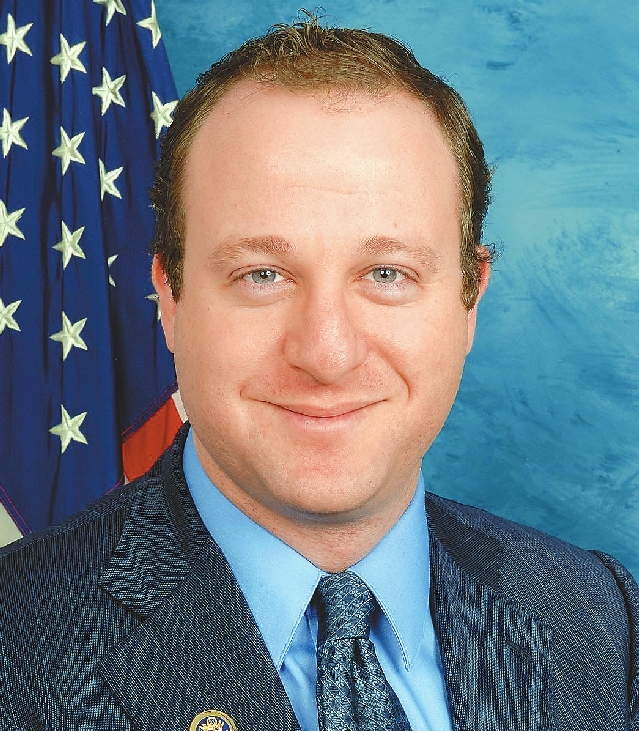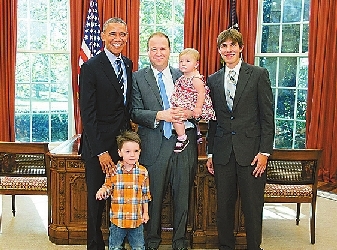

AS the world closely watched the U.S. midterm elections, Colorado voters stole the show by doing something no other U.S. state has done before: They elected an openly gay man as governor. Jared Polis, the 43-year-old Democratic congressman and a technology entrepreneur, handily beat Walker Stapleton, Colorado’s Republican treasurer, by nearly 52 percent to 45 percent, according to results released Wednesday. “Colorado is a state that values diversity,” Polis said in a pre-election day interview. “We’re willing to elect people that are going to do a good job for our state regardless of their background. … I think it’s exciting to show how far the LGBT (lesbian, gay, bisexual and transgender) community has come that it doesn’t stand in the way of being elected to the highest office in the state.” For the U.S. LGBT community, Polis’ win is a watershed moment decades in the making — amplified in part by the resistance movement of the Trump era. National leaders in the LGBT rights movement said Polis’ win would have profound effects for decades to come. “With Jared Polis becoming the first out gay governor of a state, I have no doubt today, there are children and teenagers and young adults who are looking to him and saying, ‘I’m going to be my state’s governor one day,’” said Rea Carey, the executive director of the National LGBTQ Task Force Action Fund, a nonpartisan political nonprofit in the United States. “His win inspires others.” A Polis win could also be considered the final step in rewriting Colorado’s legacy as the “Hate State,” an epithet affixed after voters in 1992 approved a constitutional amendment forbidding local governments from creating special protections for the LGBT community. “It’s a historic win — not just for the LGBT community but for the state of Colorado,” said Mary Parker, president and CEO of the Victory Fund. “The fact that the state of Colorado, in 25 years, has gone from being dubbed the ‘Hate State’ to a place that can elect someone who is not just openly gay, but publicly gay, that’s historic.” Polis’ victory was paved by years of activism to change the perception of gay people, Parker said. “It’s the culmination of a lot of work by activists to win the hearts and minds of voters to make sure that when Jared entered the race, he wasn’t judged as a gay man, but as a public servant,” she said. Polis’ race headlined a record number of LGBT candidacies across the United States. According to the LGBTQ Victory Fund, a political nonprofit that supports LGBT candidates, 147 LGBT people ran for state or federal office. According to the fund, 140 had been declared winners in their races by Wednesday. It wasn’t so long ago that a candidate or elected official coming out sent shock waves through the news media and the electorate, and could potentially ruin any shot of an electoral win, said Eric Marcus, an LGBT historian who produces the “Making Gay History” podcast. Former New Jersey Gov. Jim McGreevey, for example, resigned in 2004 after coming out amid a scandal. “That this is such a nonstory makes it a big story,” Marcus said. “We’ve reached a point in our history that the fact there is a gay candidate running for governor is not the headline. For those of us who have been around for a while, it’s shocking. It’s nice.” Polis, a Colorado native who spent his childhood in California with his self-proclaimed “hippie” parents, acknowledged he briefly wrestled with concerns over coming out as a public official. “There was always some tension between wanting to go into public service,” Polis said. But Polis’ sexual orientation has never been the sort of handicap one might expect. In 2007, when he first ran for Congress, it was rarely mentioned in the press, despite the fact his candidacy came just one year after Colorado approved a state constitutional ban on same-sex marriage. Polis, who shares two children with his longtime partner Marlon Reis, said he hopes his win makes it even easier for LGBT candidates — in both parties — to run and win without worrying about persecution. “I hope that both parties look more like America,” he said. “Which means people of different colors, people of different genders and people with different sexual orientations and gender identities.” Born on May 12, 1975 in Boulder, Colorado, and of Jewish faith, Polis is one of the wealthiest members of the U.S. Congress. As of mid-2017, he was estimated to have a net wealth of US$400 million, mostly earned through success in business. His father was a physicist and his mother was a school teacher, according to Polis. After they moved to Colorado, they decided to pursue their true passions: art and poetry. Polis spent a lot of his childhood crisscrossing the country with his parents, staying in motels and selling posters out of a pickup truck. Eventually, his parents had the idea to combine their talents — his painting and her poetry — in the form of greeting cards, which they turned into a small Colorado business called Blue Mountain Arts. While he was studying politics in Princeton University, Polis launched American Information Systems, a dial-up Internet service provider that was sold later in 1998, from his college dorm room. He also took the family greeting card business online, and founded ProFlowers, a startup where he did everything from loading the trucks the night before Valentine’s Day to taking the business public. Later, he co-founded Techstars, a startup accelerator where he mentored entrepreneurs from all walks of life, and Patriot Boot Camp, which helps veterans start their own small businesses after coming home from their service. Polis started his career in politics in 2000, when he became a member of the Colorado State Board of Education. Now a five-term congressman who promised to fight for universal health care, renewable energy standards and publicly funded preschool and kindergarten, Polis vowed to stand up to President Donald Trump’s efforts to dismantle former President Barack Obama’s health-care law. Colorado has one of the nation’s lowest unemployment rates and highest rates of economic growth, largely fueled by the tech, aerospace and oil and gas industries. Polis banked on defending Obama’s health-care law and riding a wave of anti-Trump sentiment in a state that voted for Hillary Clinton in 2016 and saw overwhelming Democratic turnout in June’s party primaries. Across the United States, candidates for state and federal office aren’t just more likely to be LGBT. They are more likely to be women and people of color, too. Trump’s election and his policies that followed — including a travel ban on Muslim majority countries and forbidding transgender individuals from serving in the military — have helped spur the new wave of candidates. However, gay rights leaders stressed that Trump was just one factor. “The last two years have given LGBTQ (lesbian, gay, bisexual, transgender and queer) a lot to mobilize around,” Carey said. “While Trump may have motivated some people, it’s hard to wake up and just say you’re going to run for office.” Rochelle Galindo is a Latina lesbian who was running to represent the city of Greeley in Colorado’s General Assembly. “What really excites people to be part of their democracy is seeing people who reflect who they are,” she said. While LGBT people across the United States are celebrating Polis’ historic win, some have a warning: Be prepared for pushback. “You can’t stop fighting,” said Marcus, the LGBT historian. “You can have a transformational moment and then you have a backlash.” Mardi Moore, the executive director of Out Boulder, an LGBT resource center, said her team is bracing for an uptick in hate violence. “We’re making sure the phones are on, the phones are staffed,” she said. “We’re checking emails, we just want to make sure we’re a resource.” Still, Moore is optimistic Polis’ win will do more to propel the community forward. “For some little kid in rural Las Animas, Colorado, who is gay and never come out,” she said. “This moment says it’s OK to be gay.”(SD-Agencies) | 
